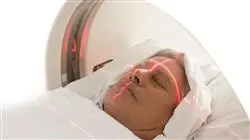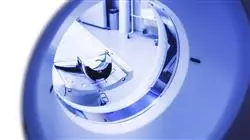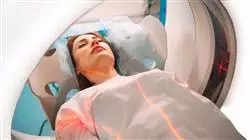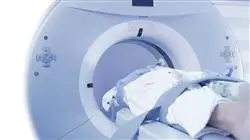University certificate
The world's largest faculty of medicine”
Why study at TECH?
Thanks to this complete program, you will delve into radiological phenomena, three-dimensional treatment planning and the use of innovative technologies. Enroll now!”

Radiophysics Applied to Advanced Radiotherapy Procedures is a discipline of great relevance in the field of Oncological Medicine, since it is focused on the application of physical and technological principles to optimize and perfect radiotherapeutic treatments. In this context, the design and implementation of advanced techniques allow for greater precision in the administration of radiation, while minimizing the risk of radiation, while minimizing the impact on the surrounding healthy tissues. The application of various advanced procedures not only enhances the therapeutic efficacy, but also contributes significantly to improving patients' quality of life.
As a result, this Postgraduate diploma in Applied Radiophysics has been created, which will address such important topics as Proton Therapy, a consolidated modality that uses protons to minimize radiation in healthy tissues during cancer treatment.
This approach will analyze the interaction of protons with matter, advanced equipment and clinical aspects, including radiation protection.
On the other hand, Intraoperative Radiotherapy will also be explored, focusing on highly precise treatments during surgery and analyzing state-of-the-art technology, dose calculations and safety. Finally, the graduate will be introduced to the physical and biological principles of Brachytherapy, radiation sources, clinical applications and ethical considerations, so that the professionals will be able to contribute to the practice and research in Hospital Radiophysics.
This university program is presented as a comprehensive program, whose didactic resources have been developed according to the state-of-the-art Relearning methodology, pioneer in TECH. This system consists of the strategic repetition of key concepts, guaranteeing an optimal assimilation of all the material. In addition, thanks to its 100% online mode, access to the platform will be available to the graduate 24 hours a day and will only require an electronic device with an Internet connection. Therefore, the student will not have to travel or adapt to pre-established schedules.
With this 100% online program you will master the most innovative procedures, such as the Flash Technique, the latest trend in Intraoperative Radiotherapy"
This Postgraduate diploma in Radiophysics Applied to Advanced Radiotherapy Procedures contains the most complete and up-to-date scientific program on the market. The most important features include:
- The development of practical cases presented by experts in Radiophysics Applied to Advanced Radiotherapy Procedures
- Graphic, schematic, and practical contents which provide scientific and practical information on the disciplines that are essential for professional practice
- Practical exercises where the self-assessment process can be carried out to improve learning
- Its special emphasis on innovative methodologies
- Theoretical lessons, questions to the expert, debate forums on controversial topics, and individual reflection assignments
- Content that is accessible from any fixed or portable device with an Internet connection
Bet on TECH! You will be immersed in Brachytherapy implantation techniques, as this involves the placement of radioactive sources directly into the patient's body"
The program’s teaching staff includes professionals from the sector who contribute their work experience to this program, as well as renowned specialists from leading societies and prestigious universities.
The multimedia content, developed with the latest educational technology, will provide the professional with situated and contextual learning, i.e., a simulated environment that will provide immersive education programmed to learn in real situations.
This program is designed around Problem-Based Learning, whereby the professional must try to solve the different professional practice situations that arise during the academic year For this purpose, the students will be assisted by an innovative interactive video system created by renowned and experienced experts.
You will delve into Intraoperative Radiation Therapy, i.e., the administration of radiation during surgery, with emphasis on technical and clinical aspects"

You will cover the physical fundamentals and clinical applications of Proton Therapy, through the extensive library of multimedia resources offered by TECH"
Syllabus
The program in Radiophysics Applied to Advanced Radiotherapy Procedures is meticulously designed to foster professional growth and excellence in clinical practice. Its structure encompasses an innovative and comprehensive curricular fabric, interweaving three fundamental modules: Proton Therapy, Intraoperative Radiation Therapy and Brachytherapy. From the interaction of protons with matter, to clinical applications and dose management, the content will challenge the limits of knowledge and prepare graduates to lead the revolution in the field of radiotherapy.

This curriculum will be your springboard to an outstanding career! You will equip yourself with the tools and confidence to positively impact the fight against Cancer”
Module 1. Advanced Radiotherapy Method. Proton Therapy
1.1. Proton Therapy Radiotherapy with Protons
1.1.1. Interaction of Protons with Matter
1.1.2. Clinical Aspects of Proton Therapy
1.1.3. Physical and Radiobiological Basis of Proton Therapy
1.2. Equipment in Proton Therapy
1.2.1. Facilities
1.2.2. Components in Proton Therapy Systems
1.2.3. Physical and Radiobiological Basis of Proton Therapy
1.3. Proton Beam
1.3.1. Parameters
1.3.2. Clinical Implications
1.3.3. Application in Oncological Treatments
1.4. Physical Dosimetry in Proton Therapy
1.4.1. Absolute Dosimetry Measurements
1.4.2. Beam Parameters
1.4.3. Materials in Physical Dosimetry
1.5. Clinical Dosimetry in Proton Therapy
1.5.1. Application of Clinical Dosimetry in Proton Therapy
1.5.2. Planning and Calculation Algorithms
1.5.3. Imaging Systems
1.6. Radiological Protection in Proton Therapy Procedures
1.6.1. Design of an Installation
1.6.2. Neutron Production and Activation
1.6.3. Activation
1.7. Proton Therapy Treatments
1.7.1. Image-Guided Treatment
1.7.2. In Vivo Treatment Verification
1.7.3. BOLUS Usage
1.8. Biological Effects of Proton Therapy
1.8.1. Physical Aspects
1.8.2. Radiobiology
1.8.3. Dosimetric Implications
1.9. Measuring Equipment in Proton Therapy
1.9.1. Dosimetric Equipment
1.9.2. Radiation Protection Equipment
1.9.3. Personal Dosimetry
1.10. Uncertainties in Proton Therapy
1.10.1. Uncertainties Associated with Physical Concepts
1.10.2. Uncertainties Associated with the Therapeutic Process
1.10.3. Advances in Proton Therapy
Module 2. Advanced Radiotherapy Method. Intraoperative Radiotherapy
2.1. Intraoperative Radiotherapy
2.1.1. Intraoperative Radiotherapy
2.1.2. Current Approach to Intraoperative Radiotherapy
2.1.3. Intraoperative Radiotherapy versus Conventional Radiotherapy
2.2. Technology in Intraoperative Radiotherapy
2.2.1. Mobile Linear Accelerators in Intraoperative Radiotherapy
2.2.2. Intraoperative Imaging Systems
2.2.3. Quality Control and Maintenance of Equipment
2.3. Treatment Planning Systems in Intraoperative Radiotherapy
2.3.1. Dose Calculation Methods
2.3.2. Volumetry and Delineation of Organs at Risk
2.3.3. Dose Optimization and Fractionation
2.4. Clinical Indications and Patient Selection for Intraoperative Radiotherapy
2.4.1. Types of Cancer Treated with Intraoperative Radiotherapy
2.4.2. Assessment of Patient Suitability
2.4.3. Clinical Studies and Discussion
2.5. Surgical Procedures in Intraoperative Radiotherapy
2.5.1. Surgical Preparation and Logistics
2.5.2. Radiation Administration Techniques During Surgery
2.5.3. Postoperative Follow-up and Patient Care
2.6. Calculation and Administration of Radiation Dose for Intraoperative Radiotherapy
2.6.1. Formulas and Dosis Calculation Algorithms
2.6.2. Dose Correction and Adjustment Factors
2.6.3. Real-time Monitoring during Surgery
2.7. Radiation Protection and Safety in Intraoperative Radiotherapy
2.7.1. International Radiation Protection Standards and Regulations
2.7.2. Safety Measures for the Medical Staff and the Patient
2.7.3. Risk Mitigation Strategies
2.8. Interdisciplinary Collaboration in Intraoperative Radiotherapy
2.8.1. Role of the Multidisciplinary Team in Intraoperative Radiotherapy
2.8.2. Communication between Radiation Therapists, Surgeons and Oncologists
2.8.3. Practical Examples of Interdisciplinary Collaboration
2.9. Flash Technique. Latest Trend in Intraoperative Radiotherapy
2.9.1. Research and Development in Intraoperative Radiotherapy
2.9.2. New Technologies and Emerging Therapies in Intraoperative Radiotherapy
2.9.3. Implications for Future Clinical Practice
2.10. Ethics and Social Aspects in Intraoperative Radiotherapy
2.10.1. Ethical Considerations in Clinical Decision-Making
2.10.2. Access to Intraoperative Radiotherapy and Equity of Care
2.10.3. Communication with Patients and Family in Complex Situations
Module 3. Brachytherapy in the Field of Radiotherapy
3.1. Brachytherapy
3.1.1. Physical Principles of Brachytherapy
3.1.2. Biological Principles and Radiobiology Applied to Brachytherapy
3.1.3. Brachytherapy and External Radiotherapy. Differences
3.2. Radiation Sources in Brachytherapy
3.2.1. Radiation Sources Used in Brachytherapy
3.2.2. Radiation Emission of the Sources Used
3.2.3. Calibration of Sources
3.2.4. Safety in the Handling and Storage of Brachytherapy Sources
3.3. Dose Planning in Brachytherapy
3.3.1. Techniques of Dose Planning in Brachytherapy
3.3.2. Optimization of the Dose Distribution in the Target Tissue
3.3.3. Application of the Monte Carlo Method
3.3.4. Specific Considerations to Minimize Irradiation of Healthy Tissues
3.3.5. TG 43 Formalism
3.4. Administration Techniques in Brachytherapy
3.4.1. High Dose Rate Brachytherapy (HDR) versus Low Dose Rate Brachytherapy (LDR)
3.4.2. Clinical Procedures and Treatment Logistics
3.4.3. Management of Devices and Catheters Used in the Administration of Brachytherapy
3.5. Clinical Indications for Brachytherapy
3.5.1. Application of Brachytherapy in the Treatment of Prostate cancer
3.5.2. Brachytherapy in Cervical Cancer: Technique and Results
3.5.3. Brachytherapy in Breast Cancer: Clinical Considerations and Results
3.6. Brachytherapy Quality Management
3.6.1. Specific Quality Management Protocols for Brachytherapy
3.6.2. Quality Control of Equipment and Treatment Systems
3.6.3. Audit and Compliance with Regulatory Standards
3.7. Clinical Results in Brachytherapy
3.7.1. Review of Clinical Studies and Outcomes in the Treatment of Specific Cancers
3.7.2. Brachytherapy Efficacy and Toxicity Assessment
3.7.3. Clinical Cases and Discussion of Results
3.8. Ethics and International Regulatory Aspects in Brachytherapy
3.8.1. Ethical Issues in Shared Decision-Making with Patients
3.8.2. Compliance with International Radiation Safety Standards and Regulations
3.8.3. International Liability and Legal Aspects in Brachytherapy Practice
3.9. Technological Development in Brachytherapy
3.9.1. Technological Innovations in the Field of Brachytherapy
3.9.2. Research and Development of New Techniques and Devices in Brachytherapy
3.9.3. Interdisciplinary Collaboration in Brachytherapy Research Projects
3.10. Practical Application and Simulations in Brachytherapy
3.10.1. Clinical Simulation for Brachytherapy
3.10.2. Resolution of Practical Situations and Technical Challenges
3.10.3. Evaluation of Treatment Plans and Discussion of Results

This academic itinerary is exclusive to TECH and you will be able to develop it at your own pace thanks to its 100% online Relearning methodology"
Postgraduate Diploma in Radiophysics Applied to Advanced Radiotherapy Procedures
Take a step into the future of medicine with the Postgraduate Diploma in Radiophysics Applied to Advanced Radiotherapy Procedures offered by TECH Global University. This unique program will immerse you in the fascinating field of medical radiophysics, giving you specialized knowledge and cutting-edge skills to excel in the world of radiotherapy. We understand the importance of staying on the cutting edge in the medical field. That is why we have designed an exceptional educational program that is delivered entirely through online classes. This modality gives you the flexibility to advance your education without interrupting your professional and personal commitments, allowing you to explore the most advanced aspects of applied radiophysics from anywhere in the world. The Postgraduate Diploma focuses on the practical application of radiophysics to advanced radiotherapy procedures. Our faculty, composed of experts in the field, will guide you through a syllabus that addresses everything from high-precision dosimetry techniques to the innovative use of advanced technologies in radiotherapeutic treatment.
Expand your knowledge in radiotherapy
TECH online classes not only offer you the convenience of learning at your own pace, but also connect you to a global community of medical radiophysics professionals and experts. You'll participate in enriching discussions, collaborate on innovative projects, and apply your knowledge in virtual environments that simulate clinical reality. Upon completion of the program, you will not only earn a recognized Postgraduate Diploma, but you will also be prepared to face the most demanding challenges in the field of radiotherapy. Your expertise in applied radiophysics will position you as a highly trained professional, contributing to the advancement of medicine and the well-being of patients who benefit from advanced radiotherapy procedures. Join TECH Global University and make this Postgraduate Diploma in Applied Radiophysics your gateway to a successful and meaningful career in 21st century medicine.







